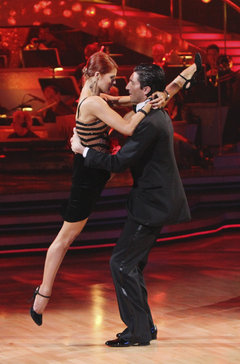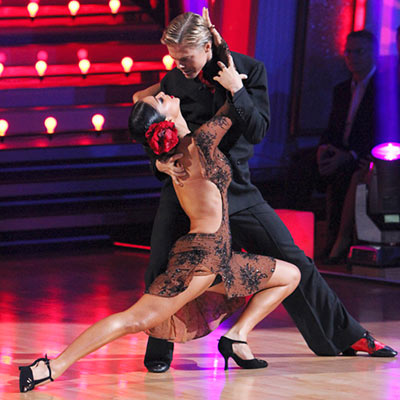Everyone has to start somewhere.

In Tango, we were all beginners at one point. But once we get past the point of being a beginner and become moderately competent, most of us do not want the challenge of dancing with a beginner again. It might make us look bad, or much worse, we may get hurt. I must point out this situation does differ between men and women. Followers usually pick up the dance a lot quicker, and if they are fairly attractive, usually have no problem getting dances, even when they are just starting out. But for leaders, its a different story. Many of my guy friends have told me that when they first started, they just watched and rarely danced. Or, they were too afraid to ask advanced followers. But I can’t help but wonder if they would improve faster if given a chance to dance with better dancers, perhaps like what they do on “Dancing with the Stars”. he he.
The topic of dancing with beginners is much debated and not easily solved. In this post, our guest writer, Tanguera Escondida, tackles the subject:
I recently said “yes” to dance a tanda with someone who turned out to be a complete beginner. I kept my game face on as he led me through a series of painful moves, careful to keep our embrace open so that I wouldn’t be knocked to the ground. We danced, topsy-turvy, in and out of traffic, plowing our way through the middle of the dance floor to take up residence in the already-moving line of dance. And then, we still managed to weave between the outer and inner lines of dance, stopping and starting on a dime to avoid crashing. He tried to lead me into a boleo (which I refused to do), tried inserting his foot between mine to execute a very poor sacada, and proceeded to attempt a smorgasbord of complicated dance moves. Some of these moves are even hard for an intermediate/advanced dancer to master. And after each song, he smiled, eyes big and round and innocent, and said, “That was great!!” I knew he was trying his hardest. I knew he was having fun. But I also started to wonder, “Why would a straight beginner even KNOW about these moves? Why isn’t a beginner just focused on walking? The embrace? The FUNDAMENTALS of tango?”

Well, I posed the question to my “all-knowing (heh)” tango partner, Klondike, who’s been around longer and seen much more than I have. He told me that some teachers sell tango lessons by introducing fancy, fun moves. That beginners want to dance tango like, “Dancing with the stars!” That they’ll get bored practicing the basics for days, months and years on end. That the only way to keep selling and selling and selling is to teach boleos and ganchos and sacadas. I know not all teachers are like this, that some focus on teaching the basics, even to experienced dancers. I just wish all the other teachers would follow suit, and help save followers from being thrown around and man-handled. What is the point of creating a herd of beginners that don’t even know how to walk?
After that particularly painful dance with that particular fancy-pants beginner, Klondike pulled me aside and said, “You know, when you dance with people who don’t know what they’re doing, you may not be asked to dance by the people who do.” I looked at him incredulously. “Really?” I said. “Just because I chose to put myself out there, to dance with a beginner, it means I’ll be shunned by other leaders?” It was hard to believe. Aren’t we all beginners once? Isn’t it lovely to see a teacher dancing with a beginner? Shouldn’t we all try hard to make beginners feel included, and say “yes” to them once in awhile? But then again, I understand that everyone watches everyone to figure out who is a good partner. If an experienced dancer sees me hobbling around with a beginner, maybe they’ll assume I’m a beginner, too. Or they’ll assume that I don’t pick my partners carefully (which is sometimes true). It seems slightly unfair. I don’t think I would turn an experienced leader down if I’d seen him dancing with a beginning lady. As long as he dances well with ME, and our chemistry is good, I’m happy.
I don’t mind dancing with beginners. What I do mind is dancing with a beginner who doesn’t have the slightest grasp of the basics. Several months ago, I danced with a wonderful beginner. He only walked me around in the line of dance, smiling sweetly. He held me in a slightly open embrace, and tried very, very hard. He was a little wobbly, his forward motion wasn’t very powerful, but boy, was he trying to master the WALK. I’ve had the joy of watching this dancer progress, and he’s gotten exponentially better. And he still asks me to dance. I’m glad that I gave him a chance, and made him feel welcome. If I’d snubbed my nose at him, maybe he would have never asked me again, even as he got better and better.
So, it seems more experienced dancers are treading a fine line when it comes to dancing with beginners. Maybe it matters more for a follower to dance with a beginning leader, rather than a leader dancing with a beginning follower. I don’t know the answers.
Maybe some of you have thoughts. How do you interact with beginners? At what point should beginners attempt to navigate the complexity of the tango dance floor? Why are they so focused on all these fancy moves? Do you discount a more experienced dancer seen with a beginner? How can we help them become a part of our community?
-T.E.
Disclaimer:The views, opinions and positions expressed within these guest posts are those of the author alone and do not represent those of SF Loves Tango. The accuracy, completeness and validity of any statements made within this article are not guaranteed. We accept no liability for any errors, omissions or representations. The copyright of this content belongs to the author and any liability with regards to infringement of intellectual property rights remains with them.
David Mendoza says
Dancing with beginners shouldn’t be complicated. One must dance to the partner’s experience level. When I have the opportunity to dance with a beginner, I’ll walk with her based on the music. If that goes well then I’ll proceed in leading her to the cross. If that is successful then ochoes until I execute a move that she doesn’t understand or can do very well. I rarely ask her verbally what she can do, it so much better just to physically execute my intent. That way I know what limitations I’ll be working with to provide my partner a fun and enjoyable dance. The main thing to have fun even if it’s only to walk. Walking in itself is an art and most dancers don’t know how to walk without having to do extraordinary movements. I love beginners. Afterall, I started as a beginner and I always do my best to remember where I came from. All you fancy and advanced dancers – remember how you started and give our new people a chance to progress. You make more friends and establish a larger partner base – be humble.
maika says
Thank you David! Great advice.
Palo Alto says
I dance with everyone – beginner or experienced, young or old, pretty or plain. I like to be inclusive. I dance just for fun, and that frees me from worrying too much about my tango cred.
When I was a young prototype tanguero, some followers gave me a chance. I remember that, and prioritize them now that I am more in demand.
K'ai Roberts Fu says
I’ve been teaching tango since 2001, and I still dance with beginners. It’s just fine to follow a new leader who is careful, considerate, and, as our author said, “trying so hard.” A good tanda with seasoned follower may be what they need to keep motivated through the difficult years of learning.
That being said, as an experienced follower (some might say, “cranky old milonguera”), I do my best to evaluate dancers of all levels before accepting a tanda: beginners are not the only ones who think they’re in “Dancing With the Stars”. With newer dancers I may need to manage their lead – for example, I will politely refuse any lead to an in-the-air anything, and will keep my eyes open for traffic and adjust as needed, to keep us safe on the floor. I don’t mind. It’s part of my responsibility to the tango community. If I can tell a leader has been dancing for a while and they’re still doing inappropriate moves, that’s when I avoid the tanda altogether.
I was once told when I went to a new community that if I was seen dancing with beginners, advanced dancers won’t dance with me. Piffle. My footwork and basic technique are the same no matter who I’m dancing with. If those leaders are really that “advanced”, they’ll know…and may even appreciate the fact I’m not too proud to dance with beginners. My experience has borne that out.
maika says
Thank you K’ai! It’s great to have your input on this topic.
Janis says
I took up Argentine Tango because I am a glutton for punishment. Surely, that must be it. With a somewhat solid background in ballroom, I soon discovered that everything I had learned was a greater hindrance to dancing tango than an asset. With the same self-knowledge that one person asks of another who speaks with a southern drawl, “What part of Texas are you from?” leaders would ask me, “Where did you learn ballroom?”
I was never at the top of the food chain as a ballroom dancer, but I suddenly slipped from a solid intermediate status to the depths of the deepest ocean, to become some obscure plankton struggling to survive my first molinetta, to endure the horrors of realizing too late that my leader wanted me to gauncho him, and me nearly tripping him with my delayed reaction. As I have progressed, I like to think I have redeemed myself somewhat, although I fear I am still on some of the more experienced leaders’ “Do not dance list.”
Yet there are times I feel light-headed/heavenly euphoric when I complete a move or a tanda that goes well, or dance a good part of an evening with few breaks, only to find myself in the dumps at the next venue, when sitting too long without a dance invitation starts to play mind-games with my “dance-esteem.”
Why do I struggle with this, when I could focus my time on ballroom dancing at elegant places like Le Colonial where the valet parks my car, instead of me scurrying down dark alleys in questionable parts of town to attend tango venues in funky buildings with icky ladies’ rooms?
It’s my “gluttony-punishment-thing.” Numerous tango dancers have shared their own experiences with me regarding this, telling me this is an incurable condition and that I should simply try to live with it.
I’m doomed.